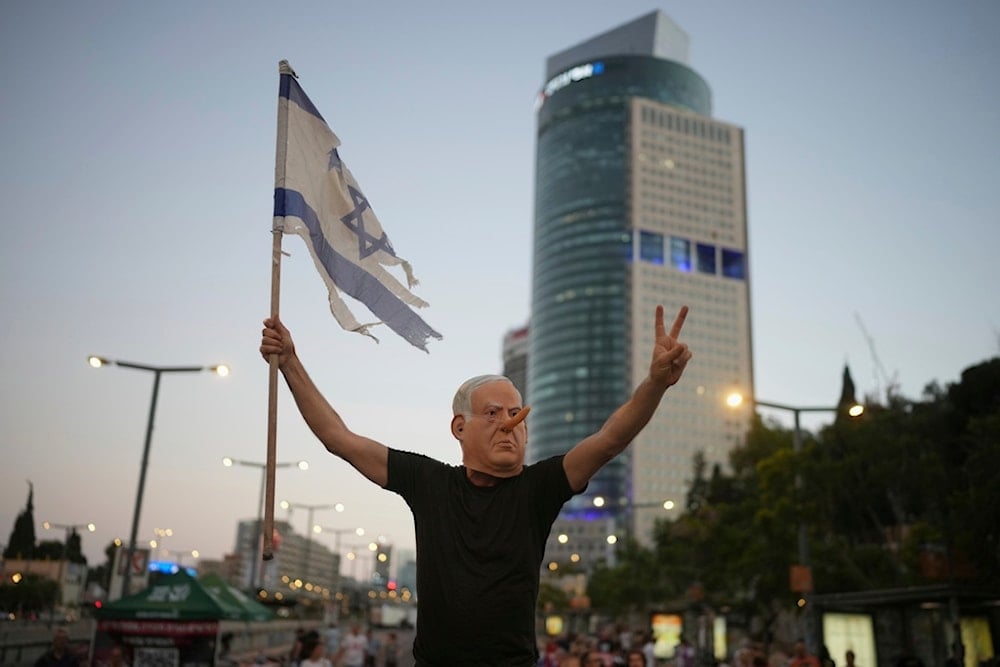'Israel’s' Qatar strike backfires, fueling diplomatic fallout
A failed bid to assassinate Hamas leaders in Qatar has reportedly strained"Israel’s" ties with Washington, rallied support for Doha, and unsettled regional diplomacy.
-

An Israeli settler takes part in a performance during a protest against Prime Minister Benjamin Netanyahu's government and call for the release of captives, in Tel Aviv, Saturday July 5, 2025. (AP)
A week after "Israel’s" missile strike in Qatar, the fallout is becoming clear, the assassination attempt on senior Hamas figures failed to achieve its goal and instead inflicted heavy diplomatic and political costs.
As Axios reporter Barak Ravid noted, the episode reinforced perceptions inside the Trump administration and abroad that Prime Minister Benjamin Netanyahu’s government is reckless and destabilizing.
"Israel’s" objective, as per the piece, was to "eliminate several top Hamas leaders" as they gathered to discuss President Donald Trump’s Gaza peace proposal. Five Hamas members and a Qatari security officer were killed, but all the key targets survived. “None of the top Hamas leaders were killed. Maybe there were some shock victims,” a senior Israeli intelligence official admitted to Axios.
Netanyahu had argued that "removing" hardline Hamas officials would ease the path toward a ceasefire and captive deal. Instead, negotiations collapsed. Hamas envoys went underground, while furious Qatari mediators suspended their role. One senior Israeli official said the group had been moving “in the direction of a deal” and that “we could have reached a breakthrough within days.” The strike, he conceded, “sabotaged the talks.”
International solidarity with Qatar
Rather than pressuring Qatar, the attack galvanized support for the Gulf emirate. Qatari Prime Minister Mohammed bin Abdulrahman al-Thani was received by Trump at Trump Tower and later by Vice President JD Vance at the White House, while Secretary of State Marco Rubio rushed to Doha to discuss defense ties. Dozens of Western and Arab governments condemned "Israel", and Arab and Muslim leaders convened an emergency summit in Doha to express solidarity.
The timing was especially sensitive, coming just ahead of the five-year anniversary of the normalization deals. Trump had hoped to expand normalization agreements between "Israel" and Arab states, but the debacle underscored how remote that goal now appears. Leaders at the Doha summit competed to denounce "Israel", with Egyptian President Abdul Fattah el-Sisi warning directly that Netanyahu was jeopardizing Egypt’s longstanding peace deal with "Israel".
A ‘super Sparta’ vision
At a press conference alongside Rubio, Netanyahu rejected claims of failure. “It didn’t fail because it had one central message … ‘You can hide, you can run, but we’ll get you,’” he said, framing the strike as a warning to Hamas that its leaders were not safe anywhere.
But a senior Israeli official involved in the deliberations described Netanyahu as increasingly intoxicated with the role of “regional bully.”
In a follow-up speech in occupied al-Quds, Netanyahu went further, portraying "Israel as a super Sparta.” He warned that growing isolation and the risk of future arms embargoes required "Israel" to build a more self-reliant economy, particularly in weapons production.
Although he later clarified he was not calling for a total trade cut-off, the remarks rattled markets, sending the Tel Aviv Stock Exchange tumbling.

 3 Min Read
3 Min Read










